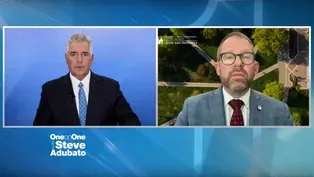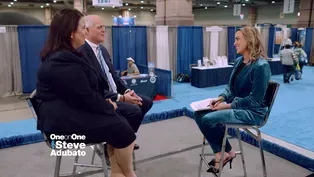One-on-One
Experiential Education at St. Benedict’s Preparatory School
Clip: Season 2024 Episode 2715 | 9m 39sVideo has Closed Captions
Experiential Education at St. Benedict’s Preparatory School
Steve Adubato and Think Tank Correspondent Mary Gamba are joined by Rev. Edwin Leahy, Headmaster of St. Benedict’s Preparatory School, to talk about the school’s resilience-building programs and the importance of community and experiential education.
Problems with Closed Captions? Closed Captioning Feedback
Problems with Closed Captions? Closed Captioning Feedback
One-on-One is a local public television program presented by NJ PBS
One-on-One
Experiential Education at St. Benedict’s Preparatory School
Clip: Season 2024 Episode 2715 | 9m 39sVideo has Closed Captions
Steve Adubato and Think Tank Correspondent Mary Gamba are joined by Rev. Edwin Leahy, Headmaster of St. Benedict’s Preparatory School, to talk about the school’s resilience-building programs and the importance of community and experiential education.
Problems with Closed Captions? Closed Captioning Feedback
How to Watch One-on-One
One-on-One is available to stream on pbs.org and the free PBS App, available on iPhone, Apple TV, Android TV, Android smartphones, Amazon Fire TV, Amazon Fire Tablet, Roku, Samsung Smart TV, and Vizio.
Providing Support for PBS.org
Learn Moreabout PBS online sponsorship(upbeat music) - Recently, together with my colleague Mary Gamba on our sister series, "Lessons in Leadership," we sat down and spoke with Father Edwin Leahy, the headmaster at St. Benedict's Prep.
in Newark, the heart of Newark, New Jersey in the Central Ward, where they teach grit, leadership, perseverance, never giving up, to young people, disproportionately Black and Brown men and women, young people in Newark.
It's a compelling and really interesting conversation with our friend, Father Ed.
- We're now joined by Father Edwin Leahy, Headmaster at St. Benedict's Prep.
Good to see you, Father Ed.
- Good to see you, Steve, thanks for having me.
- You got it.
We're talking about leadership because I'm fascinated by the Water Adversity Challenge, the WAC Challenge, WAC, W-A-C that I've been reading about.
What is it, and what does it have to do with leadership of young men and women, please?
- So as you know, by far, most of our students are from Essex County, and lots of kids who don't have, don't feel they have much of a voice.
So trying to amplify their voice is one of the things that we work hard at in creating leadership opportunities.
So we do the, all of the incoming freshmen come in and sleep on the gym floor for a week in the beginning of their freshman year, and at the end of their freshman year, they backpack the Appalachian Trail.
But I'd been thinking about it, and with different folks around here, we realized that after the backpack, there really isn't much that gives you immediate feedback on performance and on resiliency, and on the ability to become a leader, a better leader.
So we concocted two challenges, one in the 10th grade, which is the water adversity challenge that you're talking about with the help of a consulting group that works with us called Victory Road.
And part of the Victory Road team is a former Navy Seal operator, so we devised this because most kids of color, which are our kids, aren't able to defend themselves in the water, because they're never really taught to swim.
- Not a lot of experience with it, access.
- Correct, access to, and then teachers to teach 'em how to swim.
So we worked hard over the last two years there getting all of our freshmen to be able to swim.
And then in 10th grade, in the very beginning of 10th grade, they do this challenge, it's a five week program that enhances their ability to swim.
We've had kids that were afraid to go even near the pool, Steve.
To come in the pool area itself, it scared the life out of them.
So we've actually moved them through Adversity Challenge over the course of the five weeks to be able to, I watch kids that swim two lengths of the pool with their clothes on, and to tread water for three to five minutes.
- Why are you torturing these kids, Father Ed?
(all laughing) - They're the ones that we would call the Red group, which are the more fundamental kids, but they can defend themselves in the water, I'm confident of that.
There's another group that's way more, that's probably 70% of the class that will go off of a seven to eight foot tower with all their clothes on and a backpack, and a mask that's blacked out that you can't see out of.
And they go into the pool from the tower and shed the backpack, take their pants off, it could be sweatpants, whatever it is they're wearing, take their shoes off, tie the laces that in a knot, put 'em around their neck, take their pants off and inflate 'em, and remember, now they can't see, so they can be very easily disoriented.
And that part's difficult or enough, but in the water is the former Seal who then proceeds to attack them, in fact.
- [Steve] But Father Ed, hold on one second.
- [Mary] This sounds- - Father Ed, Father Ed, we've known each other for a million years, and you've come up a lot of innovative initiatives with you and your colleagues, and we'll show some video of this.
- Yeah.
- What the heck is the point of this?
Now you've got a Navy Seal attacking these kids in the pool, they can't see them.
- Correct, and the answer to the question is best described when Chris Howe, who's the Seal, taps their mask and lifts the kid's mask and to see their face, and to realize that the confidence they have as a result of being able to do that.
I mean, that tells the whole story right there.
As a result of this, we have kids in ninth grade working harder now to learn how to swim because they wanna be able to pass the WAC.
So it's become part of the place in just a very short time, three years, really.
And I'm confident that every one of our 10th graders, if they fell off of a dock, fell off a boat, they may not be able to swim for 10 miles, but they can defend themselves in the water.
They're not gonna drown within the first hour or two.
People can get to them.
- Mary, I want you to jump in, because when I first read about this, I said, "What is Father Ed and his team doing there?"
And I realize- - I know, I know.
Well, Steve, I don't know if you know, but I'm a former lifeguard, so I was a lifeguard.
- Didn't know that.
- Yeah, no, I was a former lifeguard, and so many of my friends failed because the water test was so hard.
You had to tread water for five minutes holding a brick over the water, and the second that the brick went underwater, the timer restarted.
But I could not even imagine doing this that you have said.
And I just wanted to get a sense, are there any of the students that resist this activity?
I know you're talking about the success stories, the ones that really embrace it.
Do any of them come out of it just saying like, "I can't believe you're having me do this," right?
- No.
- Is there adversity to it?
No, wow.
- Actually, the interesting thing about it, Mary, is we invite, at any point in the five weeks, any parent can come in.
- Oh, really?
- And watch it, yeah, so with the final challenge on the last day of the five week program, we invite all the parents, and I've had mothers cry up in the bleachers watching it, because they say, "Father, I have no, I can't swim, so I can't tell you how thankful I am that she or he is learning how to swim and be able to defend themselves in the water."
So many of our parents don't know how to do that, so they're afraid to go anywhere near the water.
- And if you grow up in and around Newark, and if it were not for the Boys and Girls Clubs at the time, when I was a kid, it was just the Boys Club, if it were not for the Boys Club, I would never have learned how to swim in my neighborhood in the northern section of the city in the north ward of Newark.
But beyond swimming, beyond getting over that fear, beyond the incredible accomplishment, what do you think this does for the kids who go through this longer term, Father Ed, in terms of their ability to deal with incredible adversity and challenges in life, please?
- That's, I think, that's the point of the, in addition to being able to learn how to swim, but to deal with the adversity.
There's a lot of times in life where you're gonna feel like you're sinking, right?
And what is it that you're gonna do in the face of that, right?
Are you just gonna let yourself sink, and therefore take second place, take fifth place, let somebody else get the job before you?
It's all about confidence and being able to compete in any kind of a situation, even more important now as things in this country presently begin to make it more difficult for kids like ours to gain access, right?
So to be able to compete with anybody, and in fact, to know that you're probably better than a lot of them is really, really important, I think, for these kids, and to have voice, right?
To be able to stand up and take control.
It's all run by kids, right?
The organization of the program, how it goes, the attendance, the discipline is all run by the kids who are doing the program.
- And Father Ed, tell everyone the demographics of your population, please.
- It's mostly kids of color, most of the African dispersion, so African Americans, and then the West African and Caribbean more recent immigrants, and then Latin American kids.
- Thank you, Father Ed.
- Thank you, Steve, for having me.
- You got it.
That’s Father Ed, that’s Mary, I’m Steve.
See you next time.
- [Narrator] One-On-One with Steve Adubato is a production of the Caucus Educational Corporation.
Celebrating 30 years in public broadcasting.
Funding has been provided by Horizon Blue Cross Blue Shield of New Jersey.
The North Ward Center.
The Healthcare Foundation of New Jersey.
RWJBarnabas Health.
Let’s be healthy together.
NJ Best, New Jersey’s five-two-nine college savings plan.
PNC Foundation.
PSEG Foundation.
New Jersey Sharing Network.
And by the Russell Berrie Foundation.
Promotional support provided by NJ.Com.
And by The New Jersey Business & Industry Association.
- Hello, I’m Donald Payne, Jr.
Congressman for New Jersey’s 10th District.
One organ and tissue donor can save as many as eight lives, and improve the health of another additional 75 people.
That is why I encourage everyone to register as an organ donor.
For more information about organ donation, please visit www.NJSharingNetwork.org
Essential Leadership Skills Needed in the Next Generation
Video has Closed Captions
Essential Leadership Skills Needed in the Next Generation (8m 39s)
Implementing Diversity, Equity, & Inclusion in NJ Classrooms
Video has Closed Captions
Implementing Diversity, Equity, & Inclusion in NJ Classrooms (10m 29s)
Providing Support for PBS.org
Learn Moreabout PBS online sponsorshipSupport for PBS provided by:
One-on-One is a local public television program presented by NJ PBS













